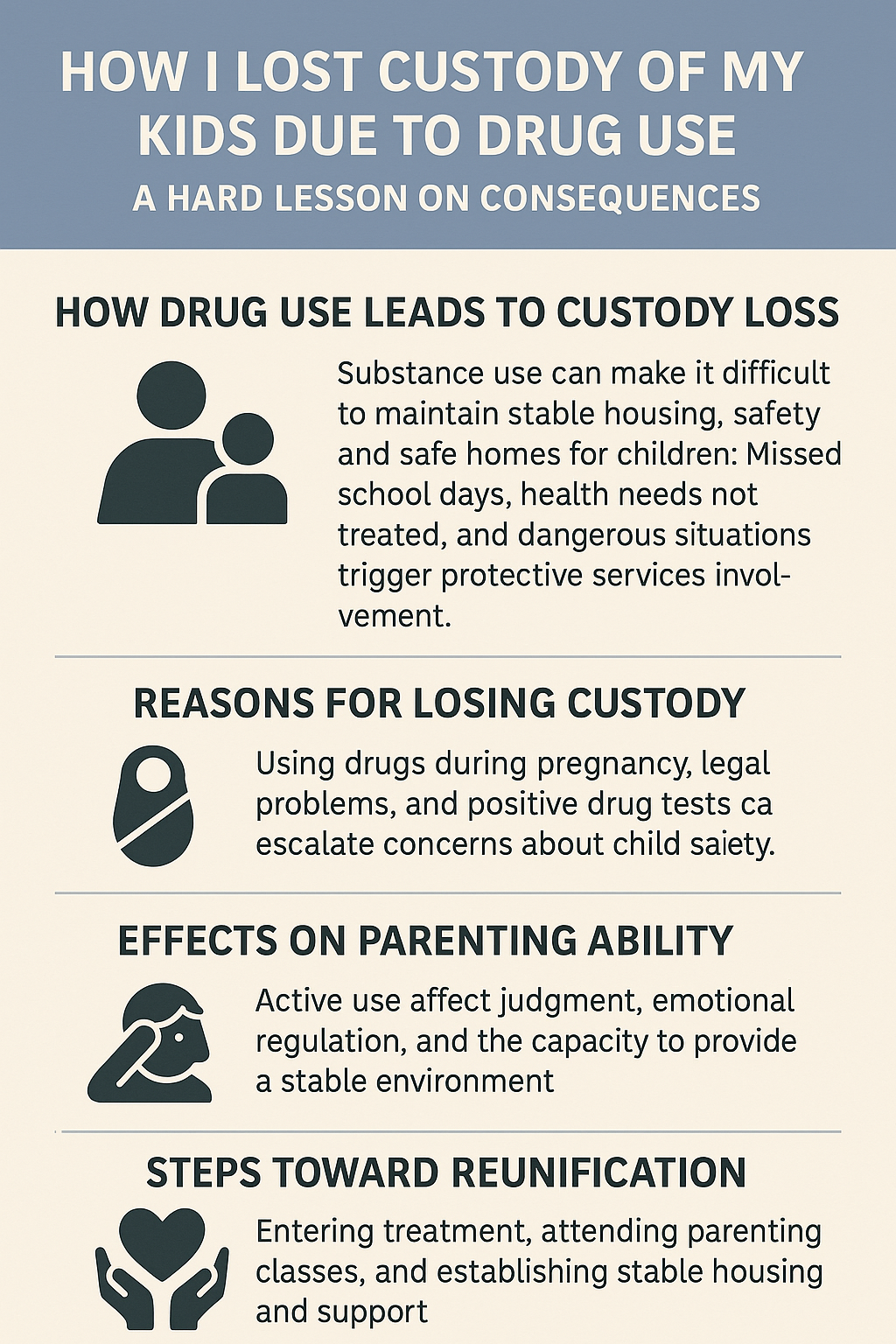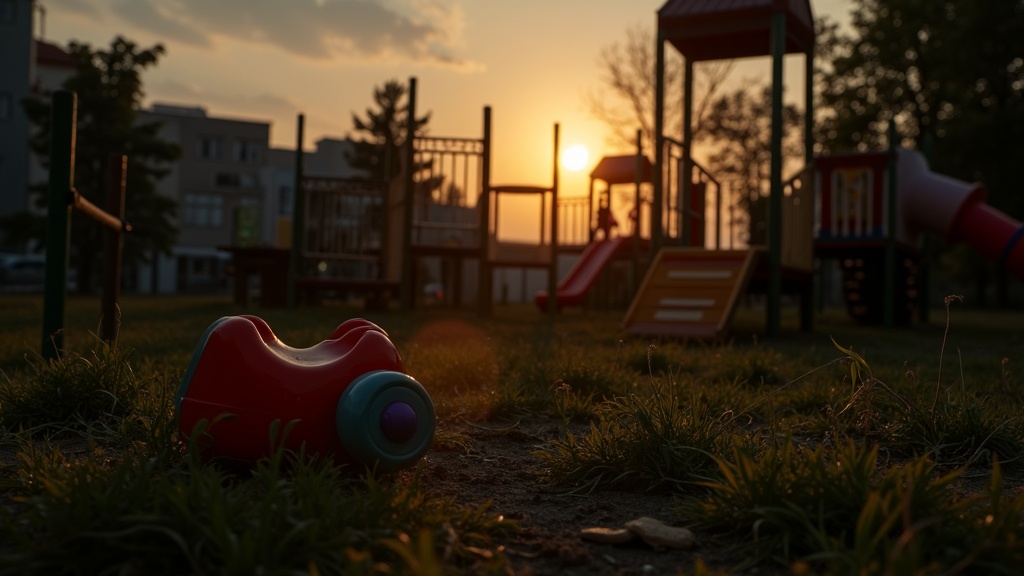Losing custody of my kids because of drug use changed my life. It forced me to face the reality of addiction—not just how it affects me, but how deeply it impacts the people I love most. You can think you’re in control, but addiction can take over and leave consequences that cut deep.
Sharing this isn’t easy, but I know many parents have gone through similar pain. That’s why I’m opening up—not for sympathy, but in hopes that someone who feels alone might find comfort or understanding in my story.
If you’re facing something similar or know someone who is, I hope what I’ve learned offers a bit of clarity and encouragement. Healing and rebuilding trust take time, but there is a path forward, and you don’t have to walk it alone.
How Drug Use Can Lead to Losing Custody
I never saw myself as a neglectful parent, but drugs changed how I acted and the choices I made. Courts and social workers look closely at any signs of risky behavior, especially if it’s tied to drug use. When it comes to the safety and well-being of kids, the legal system is very cautious. Even if you believe you’re still providing for your kids, drugs make it really hard to meet their needs the way they deserve.
If someone reports suspected drug use, whether it’s a family member, neighbor, teacher, or even your ex, it can set off an investigation. The process usually starts with a visit from a child protective services worker. They look for evidence of drug use, unsafe living conditions, or emotional neglect. If they decide the kids are at risk, the following steps can happen fast. There’s usually an emergency hearing, then a series of court dates to determine what comes next. Temporary custody is often given to a healthy coparent, another family member, or, in some cases, the state.
Understanding the Court’s Point of View
Courtrooms can feel scary, especially when the well-being of your kids is up for discussion. The main thing judges and caseworkers look at is whether a parent’s drug use directly affects the child’s safety or emotional health. They’ll consider evidence like positive drug tests, police reports, past criminal charges, or evaluations from therapists. Even when you know your love for your kids hasn’t changed, substance use sends red flags that can overshadow everything else.
Judges want to see parents taking responsibility and making clear, healthy decisions. Proof of ongoing drug use, or even recent relapses, can really hurt your chances of keeping or regaining custody. I learned firsthand that it’s not enough to “promise I’ll do better.” Judges want to see consistent changes, like clean drug tests, therapy participation, and a stable work or home life. Courts are interested not just in your words, but in your sustained actions and progress.
My Personal Experience: Facing the Hard Truth
The day I learned I was losing custody struck. I had warnings: missed school events, late meals, and mood swings that I tried to brush off as “just being tired.” The reality set in when the court handed physical custody over to my ex. It was a shock and, honestly, pretty humiliating. Still, the wake-up call forced me to look at the actual effect my behavior had on my kids. Their grades slipped, and they became withdrawn. As painful as it was, seeing them thrive in a more stable environment helped me admit things needed to change.
Losing custody not only altered my daily life, but it also forced me to dig into my own patterns, triggers, and unhealthy habits. I started remembering all the moments I’d missed or phone calls I hadn’t answered and realized how much addiction clouded my priorities.
First Steps: What Helped Me Start Turning Things Around
Losing custody felt like rock bottom, but I realized the way out started with small steps. Here’s what I found made a real difference:
- Admitting the problem. Owning up to addiction wasn’t easy or fun, but it was the foundation for every step forward.
- Enrolling in a treatment program. Structured rehab, whether inpatient or outpatient, gave me resources and accountability I couldn’t find alone.
- Embracing counseling and support groups. Meeting others who understood my struggle made me feel less alone and motivated me.
- Following court orders. I kept up with every requirement: drug tests, scheduled therapy, and supervised visitation. Missing anything only set me back.
Starting small sometimes meant simply making it through a day clean, showing up for therapy, or getting honest with loved ones. Over time, those small steps piled up and let me start looking forward again.
Small Wins: Gradual Progress after Losing Custody
When you’re trying to regain custody, the process can feel excruciatingly slow. Visits with my kids started as supervised meetings in neutral locations. Early on, I could only see them for a few hours each week. But things moved forward when I stayed consistent:
- Passing regular drug tests. Clean results over time showed a real commitment to my recovery.
- Sticking to a steady job and routine. Courts want to see kids in stable environments, so maintaining a predictable schedule really helped my case.
- Open communication with caseworkers. I kept in touch and provided honest updates, even when things weren’t perfect.
Bit by bit, trust started to build again. I got more extended visits, more input on their day-to-day life, and eventually, shared decision-making for things like school or healthcare. These wins felt small, but over weeks and months, they added up to real progress, helping my kids see that I was making changes for the long haul.
The Emotional Toll: Dealing with Guilt and Shame
Beyond the legal stuff, the emotional pain was sometimes the most challenging part. The guilt hits in quiet moments, like missing a birthday or school play. I had to work on forgiving myself and on making things right with my kids. That involved a lot of listening, plenty of apologies, and never making promises I couldn’t keep. Kids are resilient, but I learned that regaining their trust takes time and patience, and they notice every small effort.
I started journaling, which helped me process a lot of the pain and regret I felt. It let me keep track of my progress but also encouraged me to stay humble. Therapy sessions gave me tools to work through negative patterns and taught me ways to repair relationships with my kids over time. Family counseling can be a game-changer for parents and kids dealing with these situations.
How to Find the Right Support and Guidance
No one should have to go through this process alone. I found it really important to look outside my usual circle for help:
- Legal aid. Even if you can’t afford a lawyer, there are community resources and support organizations that offer advice on custody issues, court preparation, and finding treatment programs. ChildWelfare.gov is a pretty solid starting point.
- Therapists and addiction counselors. Having a neutral third party to talk to made a big difference in managing stress and keeping me focused on the positive changes I wanted to make.
- Peer support groups. Groups like Narcotics Anonymous or Parents Anonymous gave me a place to vent and share progress with people who had real context for what I was feeling.
If you don’t know where to start, reach out to a family resource center or a trusted medical provider. They often have direct lines to counselors and legal advocates who can point you in the right direction and make the road a little less lonely. Some states also offer parent mentorship programs, where you get paired with someone who’s been through the same process of losing and regaining custody due to drug or alcohol issues.
What Reunification Looks Like
Getting custody back often isn’t a single big moment; it’s more like a chain of small milestones. For me, the timeline stretched out for almost two years. Family reunification plans usually include clear checklists, including regular check-ins, home visits, continued clean drug tests, and, sometimes, random screenings. Courts need to feel absolutely confident that you’re in it for the long haul. In my case, the closer I got to consistency in my home and behavior, the more willing the system was to give me another shot.
The reunification process can include both supervised and unsupervised visits, parenting classes, drug counseling, and regular feedback from social workers. Success is all about steady follow-through, communication with everyone involved, and making healthy choices every day. Each win matters. Letting your kids see your commitment over months shows them that things are different this time, helping everyone heal.
Long-Term Changes: Staying Healthy and Keeping Family First
Regaining custody didn’t mean life went back to how it was before. I had to stay committed to my recovery every day, so my kids could count on me. Things I prioritized after reunification include:
- Ongoing therapy and support meetings. I didn’t stop going to sessions just because I got custody back. I still lean on those groups and routines today.
- Building stronger daily habits. Having a regular work schedule and being present for homework, dinners, and family activities helped rebuild our family dynamic.
- Staying honest with my kids. We talk openly about tough topics, and I encourage them to let me know if something worries them.
Maintaining a healthy lifestyle means saying no to old triggers and focusing on self-care. I started exercising more, preparing meals at home with my kids, and setting family rituals like weekend walks or movie nights. These small changes help keep our bonds strong and minimize temptation. I also make time to check in with my support network, so I don’t slip back into old habits.
Frequently Asked Questions
Here are a few questions I get all the time, especially from other parents in similar situations:
Question: Can I actually get my kids back after losing custody for drug use?
Answer: Yes, it happens all the time, but it takes persistence, proof of recovery, and close adherence to every court order. Judges want to see steady progress and a safe home environment.
Question: What’s the first thing I should do after losing custody?
Answer: Prioritize your recovery. Enroll in treatment, start therapy, and reach out for legal advice. These steps build the foundation for all future progress.
Question: How can I maintain a relationship with my kids during this process?
Answer: Even if visitation is limited, show up for every meeting, call, or video chat. Find small ways to stay involved in their lives until circumstances change.
Facing Consequences, but Finding Hope
Losing custody of my kids due to drug use taught me some really tough lessons, but it didn’t mean the end of my relationship with them. Things might have looked hopeless at first, but consistent effort, support, and patience set me on the path to rebuilding trust and creating a healthier family life. If you’re in the thick of it now, know that change is possible, even if it comes one small step at a time.
Video: What Happens When Parents Lose Custody?

